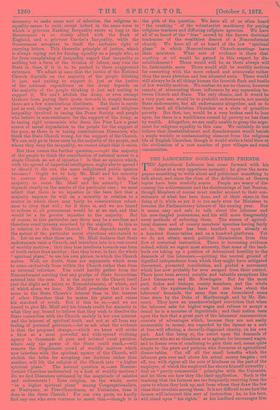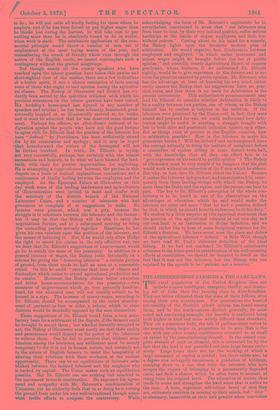THE LABOURERS' GOOD-NATURED FRIENDS.
THE Agricultural Labourer has come forward with his claims at a very opportune moment ; he gives the news- papers something to write about and politicians something to talk about, and since the close of the Arbitration at Geneva topics have been woefully scarce. People are weary of dis- cussing the achievements and the shortcomings of last Session, though Members of course must render account to their con- stituents of what has been done, and of their share in the doing of it, while as yet it is too early even for Ministers to forecast the Parliamentary labours of the coming year. But it seems easy and safe to talk about the labourer and his new-fangled pretensions, and his still more disagreeably novel methods of enforcing them. The season of agricul- tural dinners and of county members' speeches having fairly set in, the matter has been touched upon already at a hundred dinner-tables and on a hundred platforms. Yet we do not obtain much political illumination from this flow of oratorical instruction. There is increasing evidence indeed, which we regret most sincerely, that some of the land- lords are taking up a position of determined hostility to the demands of the labourers,—quitting the neutral ground of dignified independence from which they might have mitigated discontent, promoted conciliation, and guided a movement which has now probably for ever escaped from their control. There have been several notable and valuable exceptions like Lord Carnarvon and Mr. Newdegate. But for the most part, dukes and bishops, county members, and the whole ruck of the squirearchy, have but one idea about the labourers' demands, the same that was formulated some time since by the Duke of Marlborough and by Mr. Est- court. They have an unacknowledged conviction that when the labourer asks for higher wages and refuses to accept a denial he is a monster of ingratitude and their notion rests upon the fact that a great part of the labourers' remuneration consists of advantages which, because they are not easily measurable in money, are regarded by the farmer as a sort of free-will offering, a decently-disguised charity, on his own part. And this being so, the retort upon the demands of labourers who are so thankless as to agitate for increased wages, and to dream even of combining to gain their end, seems quite simple to the peers and prelates who discourse at agricultural dinner-tables. Cut off all the small benefits which the labourer gets over and above his actual money bargain ; cut off, too, with rigour all the acts of kindness on the part of the employer, of which the employed has shown himself unworthy ; deal on "purely commercial" principles with the Unionists, and let them see how they like their application. Such is the teaching that the farmers are too frequently receiving from the ' caste to whom they look up, and from whom they draw the few ideas that circulate among them. It is not difficult to see how the farmer will interpret this sort of instruction ; he, in his turn, will stand upon "his rights," as his landlord encourages him ,
to do ; he will put aside all kindly feeling for those whom he employs, and if he has been forced to pay higher wages than he thinks just during the harvest, he will take care to pay nothing more than he is absolutely bound to do in winter, when work is slack. The retributive application of the com- mercial principle would throw a number of men out of employment at the most trying season of the year, and remembering the streak of ferocity which runs through the nature of the English rustic, we cannot contemplate such a contingency without the gravest misgivings. But though nearly all the comity speakers who have touched upon the labour question have taken this unwise and short-sighted view of the matter, there are a few indications of a better spirit, if not a clearer conception of facts among some of those who ought to lead opinion among the agricultu- ral classes. The Bishop of Gloucester and Bristol has evi- dently been served by the merciless criticism with which his previous utterances on the labour question have been visited. His lordship's horse-pond has figured in any number of speeches and articles ; he has been solemnly denounced, good- naturedly laughed at, or ill-naturedly sneered at, for weeks, and it must be admitted that he has deserved some chastise- ment. Perhaps his offence, an after-dinner outburst of in- dignation against the people who have not the good fortune to agree with Dr. Ellicott that the position of the labourer has been " defined " by Providence, has been sufficiently atoned for by his recantation and apology ; and it may be hoped that henceforward the waters of the horsepond will not be further troubled. In truth, Dr. Ellicott is trying, not very successfully, perhaps, but certainly with the utmost earnestness and honesty, to do what we have blamed the land- lords, with their far greater opportunities, for neglecting. He is attempting a rapprochement between the parties in this dispute on a basis of mutual explanations, concessions, and a continuance of kindly feeling between the employees and the employed. At the Episcopal Palace at Gloucester on this day week some of the leading landowners and agriculturists of Gloucestershire were invited to meet and confer with the secretary of the district branch of the National Labourers' Union, and a number of labourers who had grievances to complain of or suggestions to make. No farmers were present, which was a pity, because the struggle is in substance between the labourer and the farmer ; but it may be that the Bishop will be able to carry the negotiations further, and at a subsequent meeting to bring the contending parties actually together. Meantime, he has given his own opinions upon the position of the labourer, and the means of bettering it. Nor, if he would only allow Hodge the right to 'assert his claims in the only effective way, can we deny that Dr. Ellicott's suggestions of improvement would go far to satisfy the mass of the peasantry. In addition to a general increase of wages, the Bishop looks favourably on a scheme for giving the "deserving labourer" a certain portion of ground, from three roods to half an acre, at a reasonable rental. On this he could "exercise that love of chance and fluctuation which seems to attend agricultural production and its results." Moreover, the Bishop claims better education and better house-accommodation for the peasantry,—two measures of improvement which go very generally hand-in- han& for the educated man will not usually submit to be housed in a stye. The increase of money-wages, according to Dr. Ellicott, should be accompanied by the entire abandon- ment of payment in beer or cider, a reform which in some districts would be decidedly opposed by the men themselves.
These suggestions of Dr. Ellicott would form a very satis- factor', basis for a settlement of the dispute, if the farmers could be brought to accept them ; but whether formally accepted or not, the Bishop of Gloucester must surely see that their reality and permanence would depend on the power of the labourers to enforce them. Can he fail to perceive that, without com- bination among the labourers, any settlement must be merely temporary I—for it is not in human nature, and certainly not in the nature of English farmers, to resist the temptation of altering their relations with their workmen at the earliest opportunity. There can be no equilibrium of interests esta- blished between the isolated labourer and the employer who is backed by capital. The Union makes such an equilibrium possible. But Dr. Ellicott can see nothing but mischief in the movement towards combination. He expresses his agree- ment and sympathy with Mr. Estcourt's condemnation of Unionism, yet he evidently feels that in so doing he is cutting the ground from under his own well-intentioned though some- what feeble efforts to compose the controversy. While acknowledging the force of Mr. Estcourt's arguments he is, nevertheless, constrained to avow that "our labourers may from time to time, by their very isolated position, suffer serious hardships at the hands of unjust employers, and that, too, without redress." Casting about in his mind for a remedy, the Bishop lights upon the favourite modern plan of arbitration. He would organise, first, Conferences between employers and employed, "in which unfair treatment and unjust wages might be brought before the bar of public opinion ;" and secondly, county Agricultural Boards of country gentlemen, whose business, if we understand Dr. Ellicott rightly, would be to give expression to the decrees and to en- force the penalties enacted by public opinion. Mr. Estcourt, who has the advantage at least of knowing his own mind, rather curtly assures the Bishop that his suggestions have no prac- tical value, and that there is no basis for Arbitration in the present controversy. This authoritative pronouncement may lead Dr. Ellicott to consider whether Arbitration is likely to be a reality between two parties, one of whom, as the Bishop himself has to confess, is helpless in his isolation. If the labourers were protected by the Union,—if, in fact, they were armed and prepared for war, we could understand how Arbi- tration might be useful in averting a struggle fraught with loss to both sides and passionate irritation against each other. But as things exist at present in the English counties, how is arbitration possible ? How is the labourer to make his grievances known ? Will he, isolated and unchampioned, have the courage solemnly to bring his matters of complaint before a committee of squires sitting in some distant town-hall, with the knowledge that all they can afford him is to "give expression on his behalf to public opinion"? The Bishop of Gloucester must be very simple if he imagines that his plan would work without an extension of the Union which he abhors. But why, in fact, does Dr. Ellicott abhor the Union? Because it makes the labourer independent, and emancipates him conse- quently from those leading-strings with which the Bishop; no more than the Duke, and the squire, and the parson, can bear to part. The key to Dr. Ellicott's conception of the whole con- troversy is to be found in one of his observations on the advantages of education, which he said would make the labourer see more and more "that he had a position defined by God, in which he should humbly endeavour to do his duty." We confess to a little surprise at this episcopal statement that the position of the agricultural labourer in our own day and our own land, is an institution of divine definition, and we should rather like to hear of some Scriptural warrant for Dr. Ellicott's doctrine. We have never seen the place and duties of the agricultural labourer " defined " in Holy Writ, though we have read St. Paul's elaborate definition of the ideal bishop. If we had not condoned Dr. Ellicott's unfortunate reference to the horse-pond in consideration of his well-meaning efforts at conciliation, we should be tempted to dwell on the fact that it was not the labourer, but the Bishop who was enjoined by the apostle to be "patient, not a brawler."



































 Previous page
Previous page